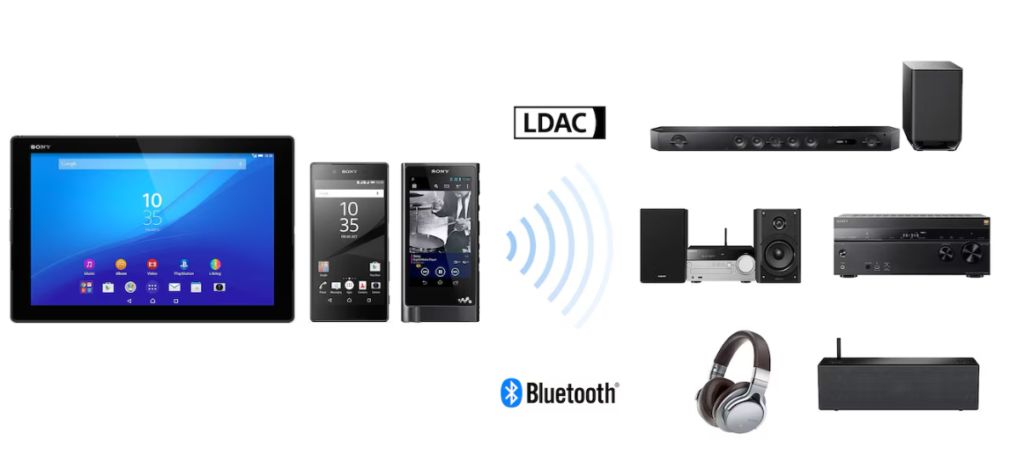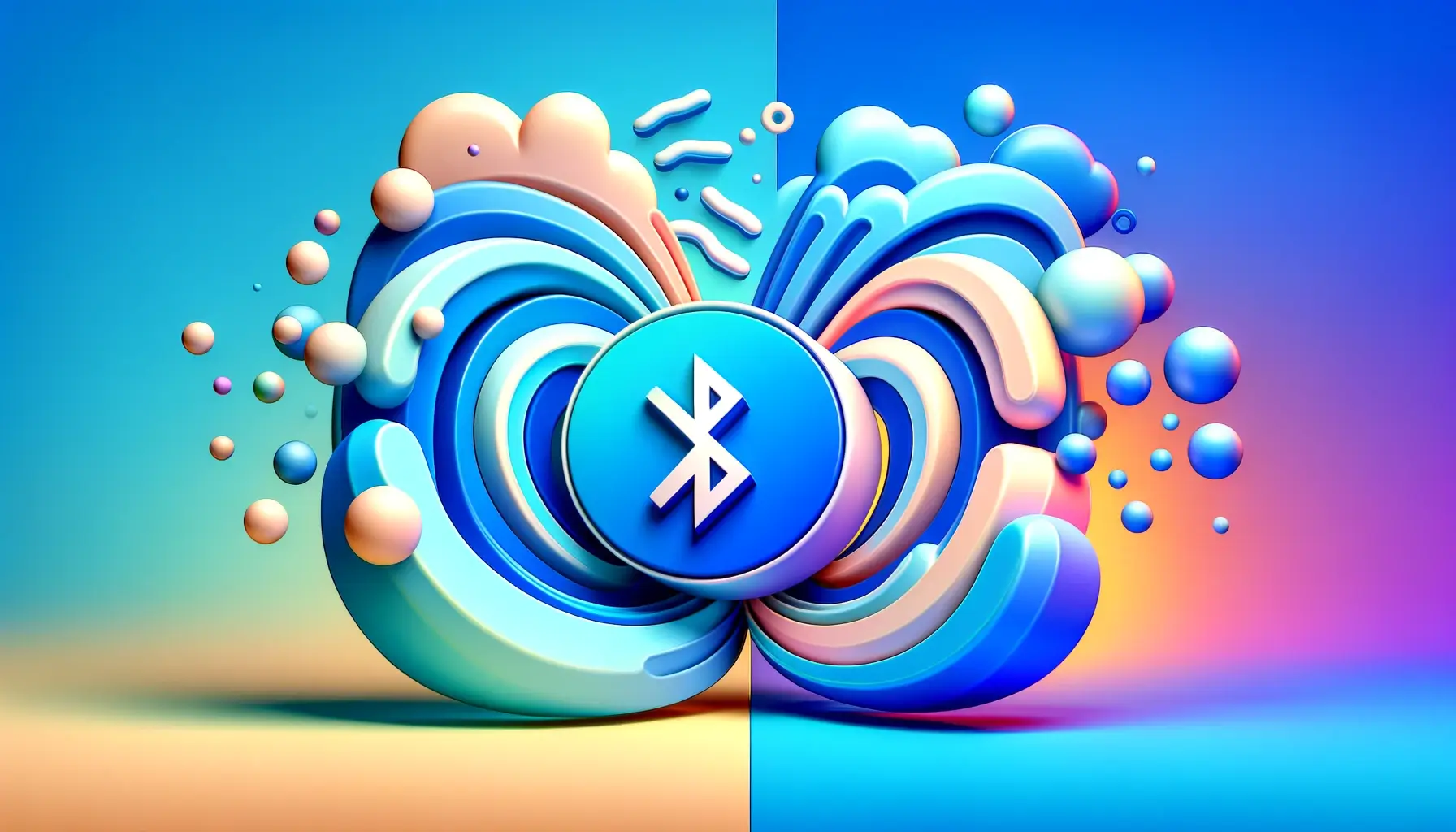Bluetooth codecs are critical in defining the compression and transmission of audio data from your devices to your Bluetooth-enabled audio gear.
Whether you’re an audiophile using Bluetooth headphones or someone enjoying casual listening on various Bluetooth devices.
Each codec, such as SBC, AAC, and aptX, offers varied strengths and weaknesses, affecting how effectively your audio enjoyment meets your expectations.
This brief guide will help you make informed choices to enhance your wireless audio experience.
Table of Contents
Key Takeaways
- Determine which Bluetooth codecs your devices support, enhancing compatibility and audio experience.
- Note the importance of codec versatility, as some are optimized for specific operating systems or device types, such as AAC for Apple devices.
- Assess the impact of advanced codecs like aptX Low Latency and LDAC in reducing audio delay and supporting high-quality audio streams.
- Learn about emerging codec technologies like LE Audio and LC3, offering improvements in audio quality at reduced bit rates, suitable for a wide range of Bluetooth devices.
Introduction to Bluetooth Audio Codecs

Bluetooth codecs determine how audio data is compressed and transmitted from your source devices like smartphones or tablets to your Bluetooth audio devices.
The Advanced Audio Distribution Profile (A2DP) is the specification for sending high-quality sound over Bluetooth, and it is part of the Bluetooth profiles used for sending stereo audio over Bluetooth.
Each codec has its strengths and weaknesses affecting sound quality, battery efficiency, and audio delay.
As we speak of codecs and technicalities involved, you must also understand the transition of Bluetooth as a technology from Version 1.0 to Version 5.4
Comprehensive Guide to Popular Bluetooth Codecs
When exploring the world of wireless audio, the choice of Bluetooth codec, including the high definition audio codec, plays a pivotal role in the quality, efficiency, and enjoyment of your listening experience.
Here, we delve into the specifics of each popular codec, helping you understand their unique characteristics and optimal use cases.
Certain codecs offer higher quality audio, emphasizing the importance of codec selection in achieving superior sound.
SBC (Subband Coding)
- Universal Acceptance: SBC is the foundational Bluetooth audio codec, mandatory for all A2DP-enabled devices, ensuring universal compatibility.
- Audio Quality: While not providing the highest fidelity, SBC offers an acceptable audio quality for general listening, balancing decent sound with good connection stability.
- Latency: SBC typically exhibits higher latency, which may cause noticeable delays in audio streaming, particularly visible in video synchronization.
If you are someone who loves to read about technology and share your knowledge amongst your friends then head to Headphonecheck to learn about headphone standards and class.
AAC (Advanced Audio Codec)
- Preferred by Apple: AAC, or Advanced Audio Coding, is widely used in Apple devices, offering better integration and optimized performance on iOS compared to other codecs.
- Efficiency: Known for its efficiency, AAC performs well at medium bit rates, providing good audio quality without excessive power consumption.
- Sound Quality: It delivers sound quality superior to SBC (Subband Coding), making it a favorable option for music streaming on both Android and iOS devices.
When comparing AAC to other Bluetooth codecs like LDAC, it’s important to note that AAC ensures consistent audio quality across various devices, including Apple and Android.
While LDAC can offer higher bitrates, AAC’s performance, particularly in terms of audio quality and bitrate efficiency, is more reliable on devices that do not support LDAC.
Furthermore, AAC’s historical performance on Android devices has shown significant improvements, making it a versatile codec choice alongside others like aptX and Samsung Scalable Codec.
Qualcomm’s aptX Series
- aptX: Provides a significant step-up in quality from SBC, supporting higher bit rates and offering clearer, more detailed audio. Qualcomm aptx have provide a seamless understanding on what their products offer and the feature they display.
- aptX HD: Extends aptX capabilities to high-definition audio, supporting up to 48 kHz / 24-bit LPCM audio data, ideal for audiophiles seeking better sound quality.
- aptX Low Latency (aptX LL): Specifically designed to address synchronization issues, aptX LL reduces latency to less than 40 milliseconds, preventing lip-sync delays in videos and enhancing gaming experiences.
- aptX Adaptive: This dynamic codec combines robustness, quality, and low latency. It adjusts automatically to provide the best audio quality or latency based on the content being played and the external RF environment.
- aptX Lossless: Supports CD-quality audio, delivering 16-bit/44.1 kHz LPCM audio, making it a top choice for those who demand lossless audio quality without wires.
Sony’s LDAC

- High-Resolution Audio: LDAC allows approximately three times more data transmission than standard Bluetooth codecs, at up to 990 kbps at 24 bit/96 kHz.
- Adaptive Bitrate: It can switch between 330, 660, and 990 kbps depending on wireless conditions, ensuring optimal audio delivery without interruptions.
- Wide Compatibility: Initially exclusive to Sony devices, LDAC is now more widely supported on various Android devices, offering a flexible solution for high-resolution audio.
LHDC (Low Latency High Definition Codec)
- High-Definition Audio: Like LDAC, LHDC supports up to 24 bit/96 kHz Hi-Res audio, promoting a richer listening experience.
- Low Latency: It achieves lower latency than many other high-definition codecs, suitable for real-time audio applications.
- Selective Adoption: While not as universally supported as other codecs, LHDC is gaining traction, particularly with audiophile-grade audio device manufacturers.
Samsung Scalable Codec
- Seamless Connection: This codec is designed to seamlessly adjust its bitrate based on the quality of the Bluetooth connection, which helps in reducing audio dropouts.
- Integration: Optimized for use with Samsung Galaxy smartphones and earbuds, it provides a more stable wireless connection by actively managing bitrate according to connection strength.
- Performance: Offers a balance between connection stability and audio quality, ensuring a reliable listening experience, particularly in environments with potential interference.
Bluetooth LE Audio and LC3 Codec
- Next-Generation Technology: LE Audio is set to revolutionize Bluetooth audio with its Low Complexity Communications Codec (LC3).
- Improved Efficiency: LC3 promises higher sound quality at lower bit rates compared to traditional SBC, making it more efficient and versatile.
- Universal Application: Designed to support a broad range of devices including hearing aids, it offers the potential for better audio experiences across all types of Bluetooth audio devices.
Each codec brings its own strengths to the table, tailored to different types of audio consumption.
From everyday listening with SBC and AAC to high-fidelity sessions with aptX HD and LDAC, the choice of codec can significantly impact your wireless audio experience.
For users demanding the utmost in audio quality and synchronization, advanced codecs like aptX Low Latency and LDAC provide the necessary performance.
Meanwhile, emerging technologies like LE Audio’s LC3 are set to broaden the capabilities of Bluetooth audio, improving accessibility and efficiency for all users.
Different types of Bluetooth Codecs
| Codec | Bit Rate (Low to Max) | Bit Depth Options | Max Sampling Frequency | Latency Performance | Codec Efficiency | Typical Use Cases |
| SBC | 192 – 328 kbit/s | 16-bit | 48 kHz | 200 ms (Poor) | Moderate | General Bluetooth audio |
| AAC | 128 – 320 kbit/s | 16-bit, 24-bit | 44.1 kHz, 48 kHz | 200 ms (Poor) | High | Streaming over Bluetooth |
| LC3 | 160 – 392 kbit/s | 16-bit, 24-bit, 32-bit | 48 kHz | Low latency (Good) | Very High | Bluetooth LE Audio |
| aptX | 352 – 384 kbit/s | 16-bit | 48 kHz | <180 ms (Average) | High | High-quality audio streaming |
| aptX LL | 384 kbit/s | 16-bit | 44.1 kHz, 48 kHz | <50 ms (Best) | Moderate | Low latency applications |
| aptX HD | 576 kbit/s | 16-bit, 24-bit | 48 kHz | 200 ms (Poor) | High | High-definition audio |
| aptX Adaptive | 279 – 420 kbit/s | 16-bit, 24-bit | 48 kHz | 80 ms (Good) | High | Adaptive bitrate streaming |
| aptX Lossless | Up to 1 Mbps | 16-bit, 24-bit | 48 kHz | <200 ms (Average) | Very High | Lossless audio streaming |
| LDAC | 330 – 990 kbit/s | 16-bit, 24-bit | 96 kHz | 200 ms (Poor) | Very High | High-resolution audio |
| LHDC | 400 – 900 kbit/s | 16-bit, 24-bit | 96 kHz | 200 ms (Poor) | High | High-definition audio |
| LHDC LL | 400 – 600 kbit/s | 16-bit, 24-bit | 48 kHz | 30 ms (Best) | Moderate | Low latency HD audio |
| Samsung Scalable | 88 – 512 kbit/s | 16-bit, 24-bit | 96 kHz | Not specified | High | Scalable Bluetooth audio |
| LE Audio | Variable | Up to 32-bit | Up to 192 kHz | Low (Very Good) | Very High | Universal Bluetooth audio applications |
Selecting the Right Bluetooth Codec: Factors to Consider

To choose the best Bluetooth codec for your needs, consider the following:
- Device Compatibility: Ensure your devices support the codec that best suits your audio preferences.
- Desired Audio Quality: Higher quality codecs like LDAC, aptX HD, and aptX Lossless are ideal for audiophiles.
- Usage Needs: For watching videos or gaming, codecs like aptX Low Latency and LLAC are crucial to avoid sync issues.
Impact of Bluetooth Codecs on Listening Experience
The choice of Bluetooth codec affects more than just audio quality. It influences how you experience music and media across devices.
High-resolution codecs can bring out the best in your music, while low latency codecs are essential for maintaining sync in multimedia applications.
Did you know?
LC3 (Low Complexity Communication Codec), the new standard for Bluetooth LE Audio, offers improved audio quality even at lower bit rates compared to classic SBC.
Conclusion
Selecting the right Bluetooth codec is crucial for enhancing your audio experience, as it determines how sound is transmitted from your devices to your ears.
By understanding the strengths and limitations of each codec—from the universal compatibility of SBC to the high-resolution capabilities of LDAC—you can tailor your audio setup to meet both your technological needs and personal preferences.
This strategic choice ensures that you achieve optimal sound quality and connection reliability, making every listening session more enjoyable and immersive.
FAQ‘s
1. What benefits does aptX HD provide over standard aptX?
aptX HD supports high-definition audio up to 24-bit, offering a deeper and more immersive sound experience compared to standard aptX.
2. Can I use different codecs on Android and iOS devices?
Yes, Android devices typically support a range of codecs like aptX, LDAC, and Samsung Seamless Codec, while iOS devices prefer AAC for optimized performance.
3. Does the choice of codec affect battery life on my devices?
Yes, more complex codecs like LDAC and aptX HD can consume more power, potentially reducing battery life faster than simpler codecs like SBC.
4. How do I change the Bluetooth codec on my device?
On Android devices, you can change the Bluetooth codec via the Developer Options in the settings menu. iOS devices automatically select the best codec compatible with the connected audio device.

